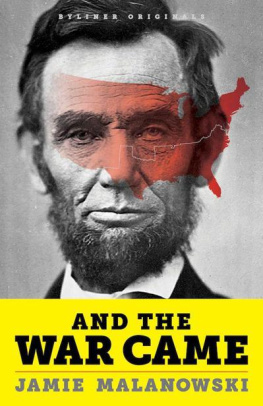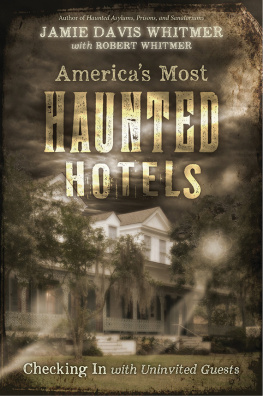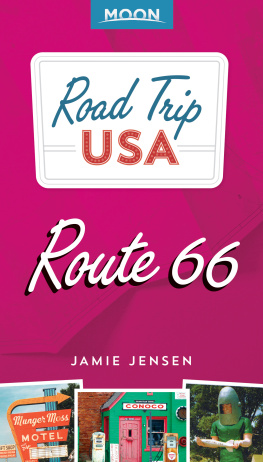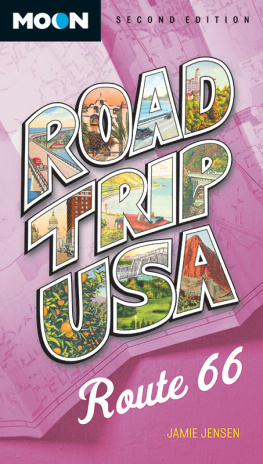Jamie Malanowski - And the War Came: The Six Months That Tore America Apart
Here you can read online Jamie Malanowski - And the War Came: The Six Months That Tore America Apart full text of the book (entire story) in english for free. Download pdf and epub, get meaning, cover and reviews about this ebook. year: 2011, publisher: Byliner, genre: Detective and thriller. Description of the work, (preface) as well as reviews are available. Best literature library LitArk.com created for fans of good reading and offers a wide selection of genres:
Romance novel
Science fiction
Adventure
Detective
Science
History
Home and family
Prose
Art
Politics
Computer
Non-fiction
Religion
Business
Children
Humor
Choose a favorite category and find really read worthwhile books. Enjoy immersion in the world of imagination, feel the emotions of the characters or learn something new for yourself, make an fascinating discovery.
- Book:And the War Came: The Six Months That Tore America Apart
- Author:
- Publisher:Byliner
- Genre:
- Year:2011
- Rating:4 / 5
- Favourites:Add to favourites
- Your mark:
- 80
- 1
- 2
- 3
- 4
- 5
And the War Came: The Six Months That Tore America Apart: summary, description and annotation
We offer to read an annotation, description, summary or preface (depends on what the author of the book "And the War Came: The Six Months That Tore America Apart" wrote himself). If you haven't found the necessary information about the book — write in the comments, we will try to find it.
And the War Came: The Six Months That Tore America Apart — read online for free the complete book (whole text) full work
Below is the text of the book, divided by pages. System saving the place of the last page read, allows you to conveniently read the book "And the War Came: The Six Months That Tore America Apart" online for free, without having to search again every time where you left off. Put a bookmark, and you can go to the page where you finished reading at any time.
Font size:
Interval:
Bookmark:

The Six Months That Tore America Apart
Jamie Malanowski
BYLINER ORIGINALS
Copyright 2011 by Jamie Malanowski
All rights reserved
Cover photograph: Alexander Gardner, circa 1863
Library of Congress, LC-DIG-ppmsca-19301
ISBN: 978-1-61452-000-9
Byliner, Inc.
San Francisco, California
www.byliner.com
For press inquiries, please contact
10 9 8 7 6 5 4 3 2 1
For my beloved daughter Cara,
with Kentucky in her sights
I WAS RECENTLY STRUCK by an observation that may have long been tired and obvious to nearly everyone, but that seemed fresh and insightful to me: The way we learn about history is strikingly at odds with the way we experience current events and life in general. History is presented to us as a kind of orderly flow, weaving around big landmark moments like Prohibition and the Depression and World War II. Life, on the other hand, comes to us all at once in a big disorderly mess. And while we try to make sense of all this turbulence, it is almost impossible to know for sure which event, large or small, will turn out to be the one on which the fate of millions will ultimately depend.
The problem with learning about these landmarks is that the truth of our history resides in the details. The true causes of events get left out of the viewfinder when we focus on outcomes. Our leaders lose their humanity when we concentrate on their decisions and neglect their indecisions, not to mention their evasions, blind spots, and mistakes. We tend to think of ourselves as the product of destiny, which has moved in a straight line of progress to reach our times, rather than seeing ourselves as the product of thousands of actions and inactions, most of which could have gone another way.
This is the story of the six months between the election of Abraham Lincoln in November 1860 and the firing on Fort Sumter in April 1861. It was, perhaps, the most intensely political period in American history: The nation had to choose a president from among four candidates; the residents of the fifteen states where slavery was legal had to decide whether or not to leave the Union; those states that chose to leave then had to decide whether to form a new government; the federal government, officially led by an ineffectual lame-duck president as a powerless president-elect spent four months standing by, had to formulate a response from options that ranged from appeasement to war. But at the start of this period, only a tiny minority of Americans would have believed that a titanic struggle lurked just beyond the horizon.
In telling this story, an effort was made to recount the events of the Secession Winter in something like real time, weekly segments that try to comprehend the developments as they happened, trying as best as possible to ignore how things turned out. That is, of course, a fictionwe know all too well that 650,000 people ended up dead, nearly $7 billion (in todays dollars) was expended, a civilization was destroyed, and black Americans escaped slavery into a century of segregation and struggle. But by knowing the ending, we can view all the preceding moments as opportunities when something different might have happenedand at least have the chance to bring that same awareness to what we see happening today.
October 1860

October 31, 1860
SEVEN DAYS TO GO until election day, and the campaigns are reaching a rousing climax. In Manhattan, the at-long-last-united Tammany and Mozart Democrats mass in the evenings under torch lights and stomp up and down Broadway bellowing for their man Stephen Douglas, while in cities and towns upstate, young Republican Wide Awakes holler and whistle for their tiger Abraham Lincoln. Apple farmers fear for their crops, as there is hardly a basket that has not already been overturned and had a surrogate speaker installed on top. The outcome of one of the bitterest presidential elections in the history of the republicor perhaps only the beginning of the outcomeis falling squarely on the shoulders of New York.
Earlier this year, when Lincoln, the Illini lawyer, looked at the electoral map, he made a stunning discovery: If he could win sixteen of the eighteen Northern states, plus the Western states of California and Oregon, he would have enough votes in the Electoral College to win the presidency.
Forget the tempestuous South; even if every Southern state fell into line behind one of his rivalsSenator Stephen Douglas of Illinois, Senator John Bell of Tennessee, Vice President John Breckinridge of Kentucky, the squabbling standard bearers of the factions of the suicidally splintered Democratic PartyLincoln could win with just the votes of the increasingly populated, firmly Free State North. And after the results from the state elections earlier this monthPennsylvania had been suspect and Indiana iffy, but both tilted decisively toward the Republicansthe erstwhile rail-splitter looked like he just might convert his audacious gamble.
But one of Lincolns anti-slavery sixteen has always needed to be New York, with its muscular thirty-five electoral votes that are more than a fifth of the 152 needed to win.
And the race in New York, once thought to be a breeze, has tightened. In the past week, Thurlow Weed, the Republican Party political boss known for his unsavory methods and infallible acumen, has taken on a decidedly dyspeptic expression. The perpetually feuding Democratic factions in New York City finally coalesced behind Douglas, and the Democratic money spigots have begun to gush.
Simultaneously, chagrined Republicans across the state report that they had spent far too lavishly during the easygoing summer, and now have little or nothing left for the final push. We are gaining so rapidly it is impossible to foretell the result, Douglass man George Sanders has been telling associates.
Impossible indeed. Even if Douglas was able to capture the Empire State, the Little Giant has no chance of winning an Electoral College victory straight up. The Southern Democrats who walked out on him at their convention in the spring will surely snub him once again. They will split their votes between Breckinridge and Bell. Should Douglas snatch New York from Lincoln, no candidate will be able to claim a majority.
The choice next week, then, is not only between Lincoln and Douglas. It is, to put it another way, a choice between having someone clearly entitled to call himself president-elect (if Lincoln prevails), and muddy irresolution that will yield a second phase of electioneering to be held according to the secret and arcane processes of the House of Representatives. Our previous experiences with this process has shown it to be rife with pitfalls. In 1800, a deadlocked House nearly elected Aaron Burr, a man who had gone into the election hoping, at most, to become vice president. In 1824, the House picked John Quincy Adams instead of Andrew Jackson, the man who had actually received the most electoral votes (but just a plurality, not a majority).
Should Douglas take New York, the Adams-Jackson scenario is almost certain to reoccur. Lincolns popular and Electoral College pluralities will not factor. In the House, each state delegation gets one vote; to win the presidency, a candidate needs the votes of at least seventeen of the thirty-three states. The Republicans control fifteen delegations, the Democrats fourteen, the American Party (heir of the anti-immigrant Know-Nothings) controls one. Maryland, Kentucky, and North Carolina are split, but Douglas has no support among the voters of those states.
Font size:
Interval:
Bookmark:
Similar books «And the War Came: The Six Months That Tore America Apart»
Look at similar books to And the War Came: The Six Months That Tore America Apart. We have selected literature similar in name and meaning in the hope of providing readers with more options to find new, interesting, not yet read works.
Discussion, reviews of the book And the War Came: The Six Months That Tore America Apart and just readers' own opinions. Leave your comments, write what you think about the work, its meaning or the main characters. Specify what exactly you liked and what you didn't like, and why you think so.












